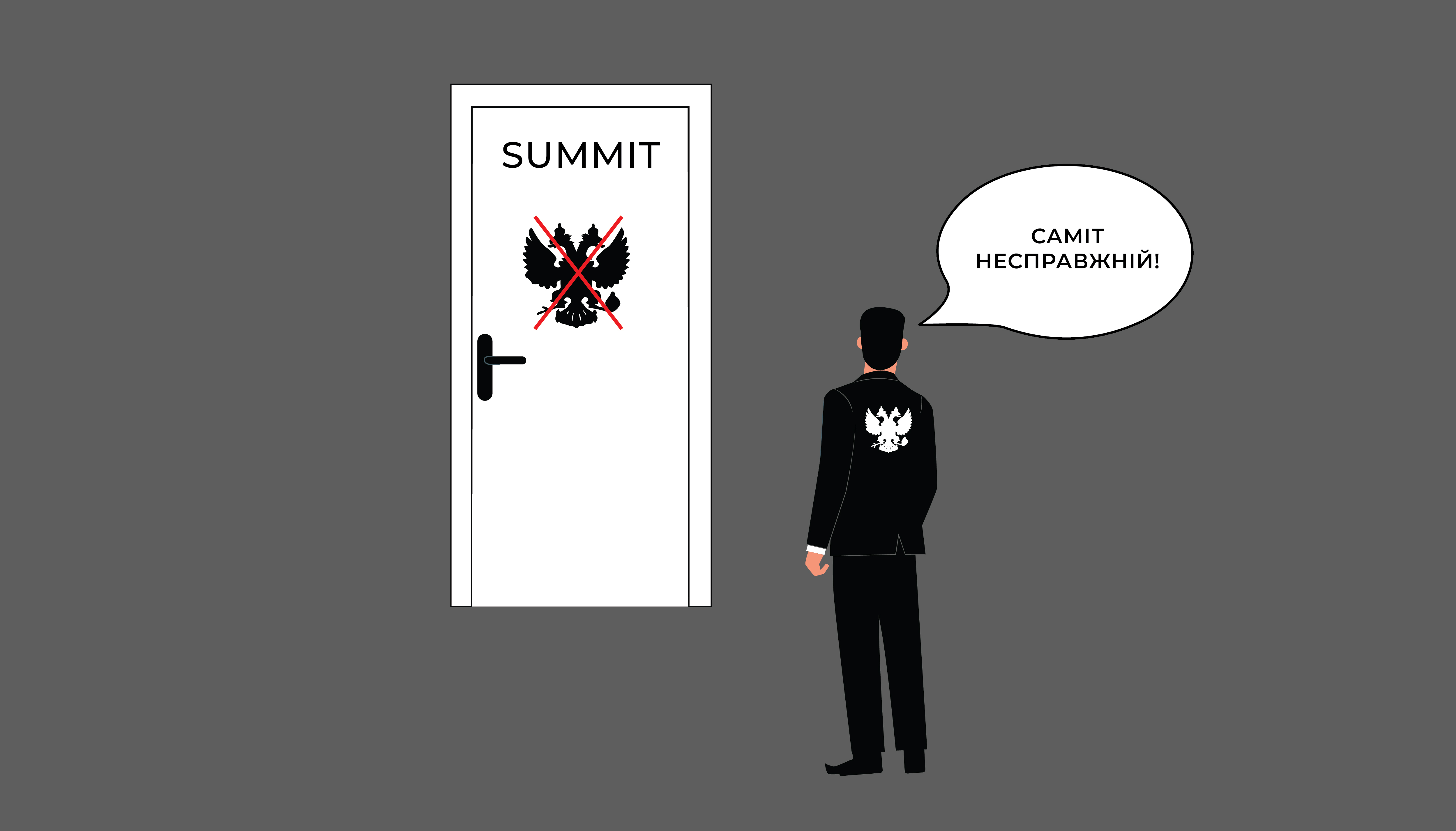Українською читайте тут.
On August 5-6, 2023, Jeddah, Saudi Arabia, hosted a peace summit spearheaded by Ukraine. Over 40 nations, alongside the UN and the EU, attended the event. This number is nearly triple that of the consultations held in Copenhagen back in June 2023. At that time, Ukraine and a majority of the Global South nations lacked a synchronized perspective on the peace plan. Presently, Kyiv has garnered support from several countries in the Global South, many of which had either stayed neutral or sided with Russia earlier. Notably, China, a nation with robust economic and diplomatic links with Russia, marked its debut at this summit. China dispatched Li Hui, its special envoy for the war in Ukraine, to the assembly. Similarly, India's National Security Advisor, Shri Ajit Doval, was present in Jeddah. Despite India's deep-rooted relations with Russia and its post-invasion surge in Russian oil imports without condemning Russia's aggression, it chose to attend. Russia, however, was not on the guest list. Indeed, the attendees had their disagreements, but a shared aspiration for enduring peace bound them. The Ukrainian-conceptualized peace formula now serves as the cornerstone for a unified approach toward ending the war and shaping a global security architecture for the future. Read more on how the Russian propaganda machine responded to this pivotal summit in our detailed article.
Ukraine is now at the forefront of the negotiation process. Both the Second Russia-Africa Summit and the NATO Summit in Vilnius awarded Kyiv more geopolitical leverage than Moscow. In an attempt to obscure its setback, Russian media outlets depicted these events as their diplomatic victories and Ukraine's failure. This portrayal was anticipated. Moscow's stance on the peace discussions regarding Ukraine, which transpired in Saudi Arabia on August 5-6, 2023, was also predictable. The Russian Foreign Ministry asserted, "Any meetings on the Ukrainian crisis, absent Russia and devoid of its interests, lack substantial merit." Mexico's President Andrés Manuel López Obrador expressed reservations about excluding Russia from the dialogue and subsequently abstained from attending. Concurrently, Brazil's President Luiz Inácio Lula da Silva remarked, "Neither Zelenskyy nor Putin has yet signaled a halt in negotiations." Nevertheless, a Brazilian delegate participated in the talks.
The Jeddah assembly also welcomed envoys from nations impacted by Russia's obstruction of the Black Sea Grain Initiative. Significantly, China, ranking amongst the top three Ukrainian grain importers, voiced its objection to Russia's termination of the Black Sea Grain Initiative. Moreover, during the Russia-Africa summit, African dignitaries, including Egypt's President, disapproved of the Grain Deal’s termination steered by Russia. Confronted with food security challenges and sensing a "betrayal" by their Russian counterparts, the Global South nations exhibited an intensified inclination to collaborate on ending the conflict in Ukraine, which might seem geographically distant but holds significance. The Ukrainian Foreign Ministry adeptly leveraged these sentiments, drawing more influential nations to the Jeddah summit. Here, the attendees concurred on establishing task forces focusing on territorial integrity restoration, Russian troop withdrawal, prisoner release, a tribunal for those responsible for the aggression, and security guarantees for Ukraine.
We previously explained how Russian media spins the war's conclusion and diminishes the core of the Ukrainian peace formula. Today, our focus shifts to the methods that Russian propaganda employs to diminish the Jeddah summit's importance.
Defamation tactics are employed to belittle, disparage, or tarnish an individual, a collective, an event, an ideology, or an institution. This approach's primary objective is to curtail the target's credibility and sway. Devaluation accentuates the target's flaws and demerits, sidelining its commendable feats or contributions. It encompasses mockery, rendering the target's endeavors ineffectual and laughable. Furthermore, devaluation can disseminate baseless or distorted facts, instigating skepticism and thereby compromising the target's repute and authority.
"Should Ukraine's Counteroffensive Fail, 90% of Delegates Might Skip the Summit"
Ahead of the summit, propagandists speculated that the event's turnout would hinge directly on the battlefield outcomes and the accomplishments of the Ukrainian Defense Forces at specific areas of the frontline. "Only if the Ukrainian Armed Forces mark significant victories in the Azov region will 90% of the delegates attend. Otherwise, we will see a repeat of the unsuccessful NATO summit in Vilnius," declared a pro-Kremlin anonymous Telegram channel. Such messages mirrored the rhetoric ahead of the July NATO summit in Vilnius, where detractors claimed Ukraine's non-invitation to the Alliance was due to an "unsuccessful counteroffensive." Yet, Euro-Atlantic integration involves multiple steps. In Vilnius, a streamlined pathway was charted for Ukraine's eventual Alliance membership, bypassing the conventional Membership Action Plan and establishing the NATO-Ukraine Council. Not once did the summit address Ukraine's readiness for NATO in terms of the momentum of its Defense Forces' counteroffensive. Similarly, during the Jeddah summit, the participants did not make any public comments on the Ukrainian Defense Forces' counteroffensive, as the attendees primarily comprised diplomats, for whom delving into military strategy isn't their responsibility.
In conflating diplomacy with military actions, Russian propagandistic narratives aim to devalue Ukraine's counteroffensive while attempting to dampen its supporters' spirits. Furthermore, they seem to foist an inappropriate role upon the summit attendees, making it appear as though they held and vocalized certain anticipations which allegedly weren't realized. Ukraine's counteroffensive is "progressing steadily," but it is very complicated and bloody. General Mark Milley, Chairman of the Joint Chiefs of Staff, acknowledging the extensive mine presence within territories being reclaimed daily by the Ukrainian Defense Forces, indicated, "The progress is slower than some people or computers would have predicted." In a skewed portrayal, the Russian propaganda machine depicts Ukraine's counteroffensive as some grand theatrical spectacle, swaying global stakeholders in their decision to participate in subsequent diplomatic "episodes."
"The Summit in Saudi Arabia is a Step Toward the Realization of the Korean Scenario"
"The drafts for the peace initiative that the President's Office holds, which notably omits Zelenskyy's formula, brings to light an intriguing template set for the Saudi meeting. This mirrors the approach adopted during the Korean War. The conflicting parties then refrained from negotiating a peace treaty directly but instead facilitated its signing through an intermediary. So, they will be discussing the format of the Korean scenario, in which Ukraine will be required to freeze the front line," suggested an anonymous Telegram channel promoting pro-Kremlin rhetoric. Propagandists subtly allude to the 1950-1953 Korean War strategy: freezing the armed conflict without a formal peace treaty and then delineating Korea's division along the 38th parallel. They argue that Ukraine might tread a similar path—resulting in a partition of the nation with an interposing demilitarized zone. Such an outcome would play into Russia's hands; for Putin, stalling the conflict represents a "triumph", considering the alternative might mean relinquishing all previously annexed territories. Therefore, Kremlin supporters fervently attempted to undermine the summit's potential success before it even began, projecting their hopes as an inevitable outcome. Their narrative suggests that global leaders would lean towards a Russia-favorable plan, compelling Ukraine into accepting it.
"The Summit's Authenticity Questioned in Light of Russia's Absence"
Previously, global leaders championed the mantra: "Nothing about Ukraine without Ukraine". Despite Russia's consistent derision of this principle—asserting they'd only converse with Ukraine's "overlords"—now the tables seem turned. Russia contends that their exclusion means any dialogue regarding the repercussions of their aggression towards Ukraine remains incomplete. The crucial meeting that saw national security advisers and foreign ministry political directors from the world's leading nations converge to discuss the pillars of reestablishing peace in Ukraine occurred without Russia.
The Russian propaganda machine offered rather cautious explanations for its diplomatic failure. One narrative suggested, "The decision to exclude Moscow wasn't primarily Saudi Arabia's—the summit's official host—but rather was steered by the actual masterminds, the US and the European Union. Had Moscow been part of it, the summit could've genuinely borne the tag of a 'peace summit'. Moscow might've been swayed—or even coerced—into certain undertakings." In this interpretation, the summit's attendees supposedly settled for generic terms like "Ukraine's territorial integrity and sovereignty should underpin any peace deal." Through this lens, Russia primarily attempts to undermine the summit's significance since its absence supposedly diminishes its outcomes. Upholding Ukraine's territorial integrity and its acknowledgment within the 1991 borders stands as a testament to Ukraine's victory. Recognition of territorial integrity ensures allies won't push Ukraine into territorial concessions to Russia in exchange for the withdrawal of invading troops from Ukraine. Simultaneously, Moscow is dabbling in hypotheticals—posing alternate realities. Their premise? Had Russia been summoned to the summit, it could've been coaxed into a peace agreement. Their non-invitation thus makes the entire summit questionable.
“Russia Would Not Have Supported the Summit Anyway Because It Does Not Like the Proposed Peace Terms.”
Dmitry Medvedev, the deputy chairman of the Russian Security Council, known in the Kremlin as a "straight shooter," commented on the Jeddah summit by stating, "Negotiations aren't necessary at this point. The enemy should come to us, prostrate and seeking mercy." This statement contradicts the earlier narrative suggesting that Russian representatives might have been willing to attend and even commit to terms in Jeddah had they been invited. What the Kremlin is saying through Medvedev is clear: it awaits Ukraine's capitulation, showing no interest in peace propositions or compromises. Recollecting the lengthy negotiation processes like the Normandy Four or the Minsk format reveals Russia's strategy – to stall, reinforce its military, and renew its aggressive campaigns against Ukraine. By February 24, 2022, 183 rounds of negotiations had been conducted between Ukraine and Russia, involving international mediators, revealing Russia's unwillingness to consider others' perspectives.
In the summer of 2022, President Zelenskyy stated that, despite his reluctance, he was ready to hold direct talks with Putin. He said, "I'm not particularly eager to converse with the president of the Russian Federation... Yet, I'm personally prepared for it at any moment... The reason no one wishes to engage with Russia is clear. They killed us, occupied us, so there is no faith. But I believe that no matter how difficult it is, we must use all opportunities." Yet, following the success of the first phase of Ukraine's counteroffensive and the pseudo-referendums in the temporarily occupied territories, both Moscow and Kyiv realized that there was a stalemate in their negotiations.
The New York Times labeled the summit a new step by Ukraine toward a broader campaign in the coming months to build diplomatic power to isolate and weaken Russia. The upcoming plans to further sideline the Putin regime by continuing diplomatic discussions are anticipated at the UN General Assembly in September 2023. An important achievement of this initiative lies in fostering ties between stakeholders who perceive their interests as distinct or at odds with Western nations. The ability to unify such a varied group of Ukraine's partners could prove vital in intensifying pressure on Russia and holding it accountable. Countering this, Russian authorities and propagandists try to downplay Russia's pariah state trajectory by asserting, "We weren't really keen on attending the Jeddah summit, to begin with."



